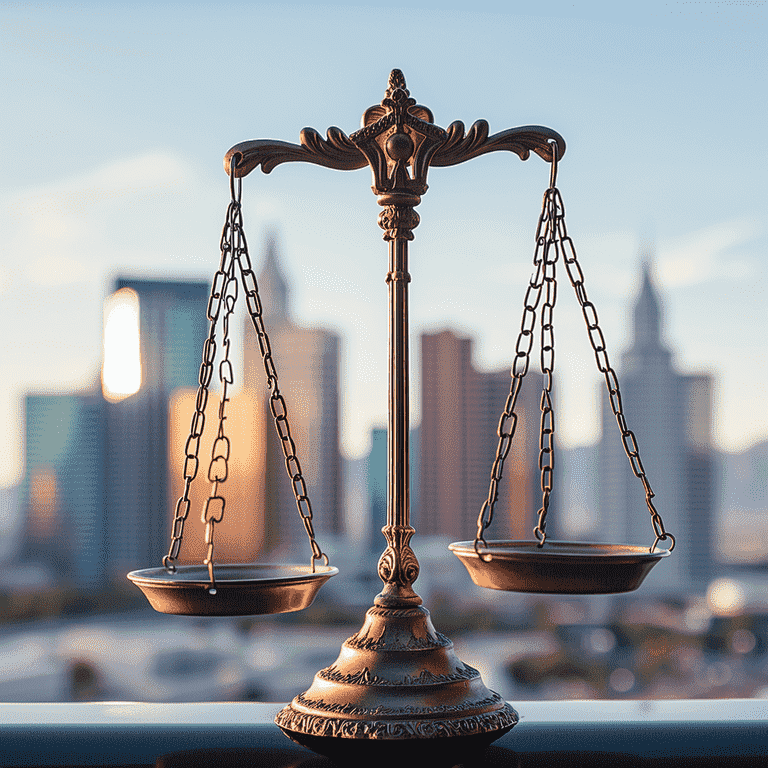Las Vegas is known for its vibrant nightlife and bustling streets. However, it also faces legal challenges, particularly theft.
Whether you’re a resident or a visitor, it’s crucial to understand the intricacies of theft laws in Las Vegas.
This article aims to shed light on the nuances of these laws. It offers critical insights for those facing theft charges in Nevada. The article also discusses legal options to protect your rights.

 Understanding Theft Laws in Nevada
Understanding Theft Laws in Nevada
Definition of Theft under Nevada Law
In Nevada, theft is the unlawful taking of someone else’s property. The taker must intend to permanently deprive the owner of it. This can range from shoplifting a small item to embezzling large sums of money. Nevada law treats theft from a person, a business, or an institution as the same crime. All are considered serious offenses.
Categories of Theft: Petit Larceny vs. Grand Larceny
Theft in Nevada includes various categories based on the value of stolen property. Minor thefts, often involving property valued at less than $1,200, are typically misdemeanors. More severe thefts, with property or services valued at $1,200 or more, are classified as felonies. The punishment severity depends on the value of the stolen property.
Specific Statutes About Theft in Nevada
Nevada’s legal code provides specific statutes that cover various forms of theft, including:
NRS 205.240: Pertaining to petit larceny.
NRS 205.220: Defining grand larceny and its penalties.
NRS 205.275: Covering theft of services.
The Severity of Theft Charges in Las Vegas
Theft charges in Las Vegas are not taken lightly. The severity of the charges can vary greatly depending on several factors.
Factors Determining the Severity of Theft Charges
Several factors influence the severity of theft charges in Las Vegas, such as:
The value of the stolen property or services.
The criminal history of the accused.
The circumstances of the theft (e.g., use of force or weapons).
Potential Consequences and Penalties for Different Levels of Theft
In Las Vegas, theft can result in fines and community service. This punishment applies to petit larceny. For grand larceny, the consequences can include imprisonment and hefty fines. Repeat offenders may face harsher penalties.
Examples of How Theft Charges Can Escalate
A seemingly minor theft can escalate into a major legal issue. For instance, a shoplifting incident can turn into a robbery charge. This happens if the perpetrator uses force or intimidation during the act.
Facing Theft Charges in Las Vegas
When facing theft charges in Las Vegas, it’s essential to understand the legal process and your rights.
The Legal Process Following a Theft Charge in Las Vegas
The legal process typically begins with an arrest. It is followed by a court hearing where charges are formally presented. The pre-trial phase follows this, with potential plea negotiations and a trial.
Rights of the Accused in Nevada
As an accused individual in Nevada, you have several rights, including:
The right to remain silent.
The right to an attorney.
The right to a fair trial.
Common Defenses Against Theft Charges
Common defenses in theft cases include lack of intent, mistaken identity, and claiming rightful ownership. An experienced attorney can help identify the most appropriate defense strategy. They do this based on the case’s specifics.
The above sections provide a foundational understanding of theft laws in Las Vegas. They also cover the initial steps in facing theft charges. The following areas will delve into legal options and strategies, protecting your rights, and the potential outcomes and consequences of theft charges.

Legal Options and Strategies
Understanding your legal options and strategies can greatly affect the outcome of a theft case in Las Vegas.
Hiring a Defense Attorney: Benefits and Considerations
Engaging a skilled defense attorney is crucial. They can navigate the legal system, negotiate with prosecutors, and represent you in court. When choosing, consider an attorney’s experience handling theft cases. Also, consider their track record and approach to client representation.
Negotiating Plea Bargains
Plea bargains can reduce the severity of the charges or the penalties. Your attorney can negotiate a plea deal. You might plead guilty to a lesser charge in exchange for a more lenient sentence. Understanding the implications of a plea bargain before accepting it is essential.
Going to Trial: What to Expect
If your case goes to trial, be prepared for a process that involves jury selection, opening statements, witness testimonies, and closing arguments. Your defense will present evidence and arguments to challenge the prosecution’s case. The trial phase is where the skills of your attorney are especially critical.

Protecting Your Rights in Theft Cases
Navigating a theft charge involves understanding the law and actively protecting your rights.
Understanding Your Constitutional Rights
You have rights under the U.S. Constitution. These include the right to due process and the right against self-incrimination. Be aware of these rights throughout the legal process.
How to Exercise Your Rights Effectively
Exercise your rights effectively by remaining silent until you have legal representation. Do not consent to any searches without a warrant. Always consult your attorney before making any decisions or statements.
Importance of Legal Representation in Safeguarding Rights
A qualified attorney is vital in safeguarding your rights. They can ensure that any evidence against you was legally obtained. They can also ensure that your rights are not violated during the legal proceedings.
Potential Outcomes and Consequences
It is vital for anyone facing theft charges in Las Vegas to understand the possible outcomes and consequences.
Best and Worst-Case Scenarios in Theft Cases
The best-case scenario could involve a dismissal or acquittal of charges. The worst-case could involve a conviction with maximum penalties. Discussing these scenarios with your attorney to set realistic expectations is essential.
Long-Term Implications of a Theft Conviction
A theft conviction can have long-term consequences. It can lead to a criminal record. This may affect future employment, housing opportunities, and more. Understanding these implications is crucial in deciding how to proceed with your case.
The Role of Criminal Records in Future Opportunities
A criminal record can hinder future opportunities, complicating securing jobs, loans, or housing. In some cases, it’s possible to have a record sealed or expunged, depending on the nature of the conviction and subsequent behavior.
Preventive Measures and Legal Advice
Prevention and awareness are vital to avoiding legal complications related to theft.
Tips to Avoid Being Implicated in Theft
Simple tips can help prevent inadvertent involvement in theft. Being aware of your surroundings, keeping track of your belongings, and understanding employee theft laws can help.
Legal Advice for Those Facing or Vulnerable to Theft Charges
If you’re facing theft charges or believe you might be at risk, seek legal advice immediately. An attorney can provide guidance specific to your situation.
How to Seek Legal Help in Las Vegas
In Las Vegas, there are many resources for legal assistance. Look for law firms that specialize in criminal defense. Check the Nevada State Bar for referrals. Consider legal aid societies if you require financial assistance.
By understanding the legal landscape and actively engaging in your defense, you can navigate the challenges of facing theft charges in Las Vegas. Remember, knowledge is power, and proper legal support is essential in protecting your rights and future.
Why You Have Not Hired a Felony Defense Attorney Yet
Watch this short video to take the next big step toward defending your rights against a felony charge.

Breaking It All Down for You
Navigating the complexities of theft laws in Las Vegas can be a daunting experience.
Understanding the basic definitions and categories of theft is important. It helps in comprehending the legal processes and potential outcomes.
It’s a journey fraught with challenges. This article aimed to provide a comprehensive guide for those facing theft charges in Nevada. It offered insights into the legal options available to protect their rights.

Frequently Asked Questions
What should I do if I’m falsely accused of theft in Las Vegas?
If you’re falsely accused of theft, remain silent and avoid speaking to law enforcement without a lawyer. Gather evidence that supports your innocence, such as receipts, witness statements, or alibis. Contact a defense attorney as soon as possible to protect your rights and build a strong defense.
Can I be charged with theft for keeping lost property in Las Vegas?
Yes, keeping found property without making reasonable efforts to return it to the owner can lead to theft charges in Las Vegas. This is often considered theft by possession or control under Nevada law. If you find lost property, take steps to locate the rightful owner or turn it in to the appropriate authorities.
What are the potential long-term consequences of a theft conviction?
A theft conviction can have lasting impacts on your life. It can result in a criminal record, which may affect future employment, housing opportunities, and other aspects of your life. Understanding these long-term implications is crucial when deciding how to proceed with your case and whether to accept a plea bargain.
How can I find a qualified defense attorney for my theft case in Las Vegas?
To find a skilled defense attorney in Las Vegas, look for law firms that specialize in criminal defense and have experience handling theft cases. Check the Nevada State Bar for referrals and consider the attorney’s track record and approach to client representation. If you need financial assistance, consider contacting legal aid societies.
What’s the difference between burglary and theft under Nevada law?
In Nevada, burglary involves entering a building with the intent to commit a crime inside, such as theft or assault. Theft, on the other hand, is the unlawful taking of someone else’s property. Burglary doesn’t always involve theft, and theft can occur without burglary.
Are there any diversion programs for first-time theft offenders in Las Vegas?
Yes, Las Vegas offers diversion programs for some first-time offenders, particularly in minor theft cases. These programs may include requirements like restitution, community service, and counseling. Successfully completing a diversion program may result in the charges being dropped, allowing you to avoid a criminal conviction.
How does Nevada law handle theft of intellectual property?
Intellectual property theft, such as software piracy or copyright infringement, is a crime under Nevada law. These cases can involve both state and federal laws, and the penalties can be severe, including substantial fines and potential imprisonment. If you’re facing charges related to intellectual property theft, it’s essential to seek experienced legal counsel.
What are the legal consequences for employee theft in Las Vegas?
Employee theft is treated seriously in Las Vegas and can result in charges of theft or embezzlement, depending on the specific circumstances of the case. Consequences may include termination of employment, criminal charges, restitution, and possible imprisonment. Employers have the right to pursue legal action against employees who steal from the company.

Glossary
Theft: The unlawful taking of someone else’s property with the intent to permanently deprive them of it.
Petit Larceny: A category of theft in Nevada involving the stealing of property valued at less than $1,200. It is typically treated as a misdemeanor.
Grand Larceny: A more severe theft in Nevada where the stolen property or services are valued at $1,200 or more. It is classified as a felony.
Burglary: The illegal entry into a building intending to commit a felony, theft, or assault inside.
Diversion Program: A legal option for first-time offenders, allowing them to participate in specific programs (like restitution or counseling) instead of facing standard criminal prosecution, potentially leading to the charges being dropped.
Expungement: The process of sealing a criminal record from state or federal databases, making it inaccessible through standard background checks.
Statute of Limitations: A law that sets the maximum time after an event within which legal proceedings may be initiated.
Shoplifting: A theft that involves explicitly taking goods from a retail establishment without paying for them.
Intellectual Property Theft: The stealing of creations of the mind, such as inventions, literary and artistic works, designs, symbols, names, and images.
Embezzlement: A form of theft where someone trusted with someone else’s property or money takes it for their use.
Felony: A serious crime, typically involving violence, regarded more severely than a misdemeanor, usually punishable by imprisonment for more than one year or death.
Misdemeanor: A lesser criminal act, less serious than a felony, and generally punishable by less severe penalties such as a fine or a short jail term.
Plea Bargain: An agreement in a criminal case between the prosecutor and defendant whereby the defendant agrees to plead guilty to a particular charge in return for some concession from the prosecutor, often a reduced sentence.
Self-Incrimination: The act of exposing oneself to an accusation or charge of crime to involve oneself or another in a criminal prosecution or the danger thereof.
Criminal Record: A record maintained by law enforcement agencies of a person’s arrests and convictions.
Restitution: Restoring something lost or stolen to its proper owner; compensation for loss, injury, or harm caused by an individual’s actions.
Additional Resources for You

Facing criminal charges can be an overwhelming and daunting experience. To navigate these challenging times, it’s essential to have access to reliable and expert legal advice. Our lead attorney, Molly Rosenblum, Esq., has developed a comprehensive array of resources tailored to assist you in understanding and addressing various criminal charges. Each resource offers in-depth insights and guidance to help you make informed decisions during these critical moments. Here’s a list of valuable resources created by Molly Rosenblum, Esq.:
Theft Crime Defense Lawyer: A specialized resource offering expert guidance for those facing theft-related charges. Explore here.
White Collar Crime: Navigate the complexities of white-collar criminal charges and understand your legal options. Learn more.
Racketeering Charges: Uncover the specifics of racketeering charges and the legal avenues available to you. Read further.
Fraud Charges: Gain insights into various aspects of fraud charges and how to effectively address them. Discover details.
Embezzlement Charges: Understand the serious nature of embezzlement charges and explore your defense options. Find out more.
Identity Theft Charges: Dive into the complexities of identity theft charges and learn how to navigate these allegations. Get informed.
Larceny Charges: Familiarize yourself with larceny charges and the legal strategies to handle them. Explore your options.
Credit Card Fraud Charges: Understand the implications of credit card fraud charges and the defense strategies available. Learn strategies.
Burglary Charges: Get detailed information about burglary charges and how to approach your defense. Read more.
Robbery Charges: Discover the specific challenges associated with robbery charges and the legal responses to consider. Learn the law.
Grand Theft Charges: Navigate the legal landscape of grand theft charges and understand the potential consequences and defenses. Know your rights.
Molly Rosenblum, Esq. is dedicated to providing you with the necessary resources and support to address your legal concerns effectively. Each resource is meticulously designed to offer specialized knowledge, equipping you with the insights needed to handle your case with confidence and clarity.

Offsite Resources You May Find Helpful
Here are seven offsite resources related to the content that you may find useful:
American Bar Association (ABA): The ABA provides a wealth of legal resources, including guides on various areas of law and legal assistance. Visit ABA
FindLaw: A comprehensive resource for legal information, including detailed articles on criminal law and theft. Visit FindLaw
National Association of Criminal Defense Lawyers (NACDL): Offers resources and support for criminal defense attorneys and individuals facing criminal charges. Visit NACDL
- Justia: A platform offering free case law, codes, regulations, and legal information for lawyers, business, students, and consumers. Visit Justia
NOLO: Specializes in legal information for consumers and small businesses, offering articles, guides, and legal forms. Visit NOLO
The Innocence Project: Focuses on wrongful convictions, providing resources and information for those wrongly accused and their legal representatives. Visit The Innocence Project
These resources offer a broad range of information that can be particularly useful for those seeking to understand more about criminal law, defense strategies, and legal rights.

A Special Message From Our Lead Attorney
Why You Might Need a Lawyer

Molly Rosenblum, Esq
Dear Reader,
Thank you for taking the time to explore our resources to understand theft laws in Las Vegas.
I hope you found the information insightful and helpful in navigating through a complex and often daunting area of law.
If you have any further questions or face legal challenges related to theft charges, I invite you to schedule a free consultation with us at
The Rosenblum Allen Law Firm. Our experienced team is committed to providing the support and guidance you need to protect your rights and navigate the legal system effectively.
Please call us at (702) 433-2889 to arrange your consultation. We are here to help and look forward to the opportunity to assist you.
Best Regards,
Molly Rosenblum, Esq.






